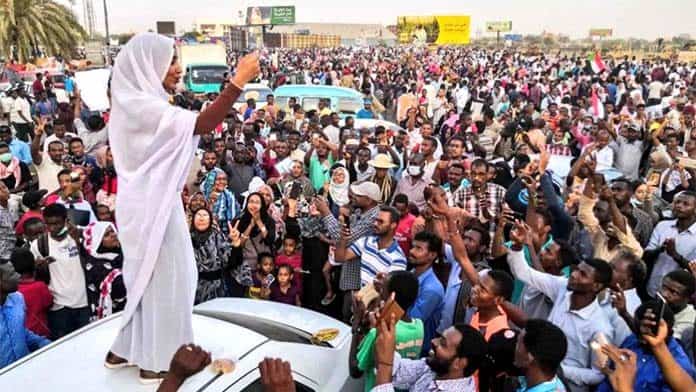Ending the domination of Israel in the Middle East and the Western imperialism behind it will require revolution, writes James Supple
The horror unfolding in Gaza shows not just the brutality and racism of the Zionist Israeli state. It shows the barbarity of the global capitalist system as a whole.
Israel’s actions would not be possible without the funding, arming and support of the world’s most powerful governments, including the US, Britain and the European Union, as well as their partners like Australia. They are facilitating an effort at genocide unfolding in real time.
This is the result of the imperialist competition for wealth, power and profits that is a product of capitalism. The US and its allies like Israel are prepared to unleash hell in order to maintain Israel’s military dominance in the Middle East, and wider US control over the whole region.
Israel was humiliated by the Hamas attack on 7 October and wants to reassert its absolute military superiority.
Control of the Middle East has been a major concern for the global powers since the importance of its oil reserves became clear during the First World War.
They are the source of enormous wealth and major states including China, South Korea and Japan rely heavily on them to run their economies. This means that whoever controls the oil, and the ability to shut it off, has the power to cripple them.
The genocide in Gaza is just one of the catastrophes that capitalism is creating.
The world’s powerful countries are also feeding the continuation of war in Ukraine, where the US and its NATO allies see a chance to weaken their rival Russia.
Australia is pursuing a massive military buildup as part of US preparations for conflict with China, including the $368 billion nuclear submarines.
We are also facing climate catastrophe, with record global temperatures, fires and extreme weather events sweeping the globe.
World leaders have totally failed to take the action needed, despite almost 30 years of global summits to discuss the problem of global heating.
The Australian government is still pouring fuel on the fire through allowing new coal and gas projects.
To end these outrages we need to fight the system as a whole.
Mass movements
There has been widespread disgust with Anthony Albanese and the Labor government for backing Israel. It’s obvious to the tens of thousands on the streets each weekend that change will not come from inside parliament.
If the rich and powerful can use their control of the big companies that dominate the economy to impose their will on the Labor Party over Palestine, climate, and any other issue, then we need more fundamental change than what elections can offer.
In Australia, business sees support for US power as vital to securing their own profits and power as an imperialist power in the local region. This is why both Labor and Liberal governments are united on supporting the US and Israel.
Real change comes from mass movements and revolts outside parliament.
The worldwide protests in solidarity with Gaza have been an inspiring example of resistance. Tens of thousands have defied efforts to ban protests in France, Germany, the UK and in Sydney.
There have been enormous crowds week after week in the biggest anti-war protests since the Iraq War in 2003.
Here, unionists are developing rank and file networks out of the rallies, taking workplace action and build stronger union solidarity for Palestine.
This has to grow into action on another level in order to break governments from supporting Israel’s war.
The movement that forced Australian troops out of the Vietnam War involved enormous mass demonstrations, disruptive action that broke the law, and strike action on a wide scale as workers joined the weekday Moratorium marches.
But ending Israel’s military dominance will require revolution across the Middle East to topple the dictatorships in countries like Egypt, Jordan and Saudi Arabia that collaborate with Israel.
Ending a world system based on imperialism and war means a revolution to get rid of capitalism completely.
Revolutions
Revolutions have been remarkably common over the last century. Often they have been triggered by the horror of war.
Portugal’s colonial war in Angola was ended by a revolution in 1974, as army officers brought down the dictatorship.
The First World War was also ended by revolution. Russia pulled out of the war after the revolution of 1917, and Germany finally ended the war the following year after mutiny in the armed forces and mass revolt toppled the Kaiser’s government.
The Middle East also has a rich history of revolution, from the wave of revolts that threw off European colonial rule after the Second World War to the revolutions of 2011 that brought down the regimes in Tunisia and Egypt.
More recently revolution in 2019 toppled a dictator in Sudan.
So what makes a revolution possible?
Revolutions begin when the mass of the population start to take their own action in response to social crisis.
They require mass protests and strikes on a truly gigantic scale. In Egypt in 2011 it is estimated over 16 million people took part directly in strikes and demonstrations.
Most of the time those taking to the streets do not start out demanding a revolution.
They move into action over more immediate concerns.
So in Russia in 1917 the revolution began when thousands of women textile workers began striking over the shortage of bread. This quickly developed into a movement against the war, which was crushing living standards, and the autocratic government behind it.
In Tunisia, the first of the revolutions of 2011, it was the desperation of unemployed youth that began the revolt.
When Mohamed Bouazizi set himself on fire after government officials confiscated the food cart he was selling in an effort to make a living, it triggered mass protests.
Demands around living standards can quickly develop into calls for the fall of the regime.
A mass movement on a revolutionary scale poses a threat to any government, which means they often respond by using the police and the army against them. Such actions show those on the streets that toppling the regime is necessary to win their demands.
Revolutions do not simply result from grinding poverty and oppression. They also require masses of people to break the barriers of hopelessness and fear that stop them acting to change society.
In 2011 the success of revolution in Tunisia inspired mass revolt in Egypt and then across the whole region.
It provided millions of people across the Arab world with the confidence to take to the streets against autocratic regimes.
Palestinian resistance has also played this role in the past.
The First Palestinian Intifada in 1987 helped inspire an uprising of workers and the poor in Algeria the following year. Solidarity with the Second Intifada in 2000 produced demonstrations in Egypt that helped launch the opposition movements that played a key role in the 2011 revolution.
The current Israeli onslaught on Gaza is radicalising millions.
The scale of the protests in solidarity can build the confidence of tens of thousands of people about the possibility of fighting for change. This can feed into an ongoing movement to challenge the system.
Workers
Building the movement for Palestine in the unions and the wider working class is vital.
Workers have been central to all the most powerful revolutionary movements.
This is because workers’ strike action has the power to disrupt the flow of profits on which capitalism and the ruling class depend.
Workers’ action can paralyse transport, the electricity system, factories and the operations of government. A mass strike movement also disrupts society on such a scale that it can bring down any government.
Workers’ involvement on a large scale was a key reason for the success of the revolutions of 2011 in Tunisia and Egypt, compared to other revolts that year in places including Syria and Bahrain.
Similarly in Sudan in 2019 the Sudanese Professionals Association, based among doctors and teachers, played a key role in the mass protests that brought down the dictator.
But the working class is also the only force capable of ending capitalism and replacing it with a different kind of society based on democratic control of the economy and the wealth currently in the hands of a small elite.
The failure of the Arab revolutions of 2011 to develop into social revolutions that put workers and the poor in power resulted in their eventual defeat.
In Egypt an even more brutal military dictatorship emerged to stamp out the revolutionary movement.
Similarly in Sudan, after the revolution removed the dictator in 2019, some sections of the revolutionary movement compromised with the military in the hope they would grant democratic reforms. Instead the military has sought to maintain full control.
The direction a revolution takes depends on the level of workers’ struggle and the strength of socialist organisation in the working class.
We need to build socialist organisation through every struggle that can develop workers’ consciousness and confidence to fight.
This is the power that can free Palestine and put an end to imperialism and all the horrors and catastrophe that capitalism is bringing us.






